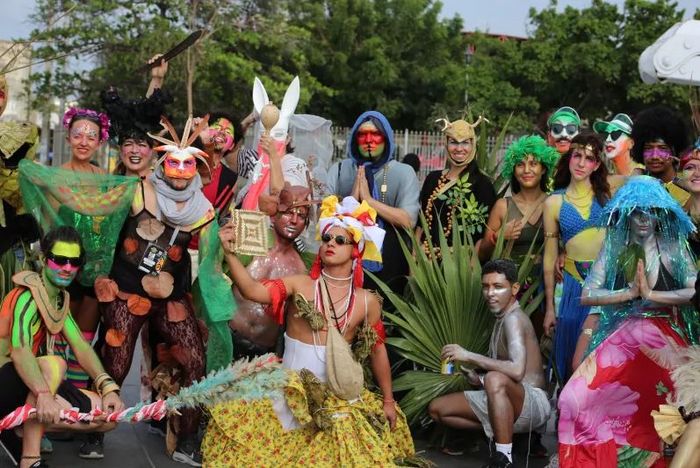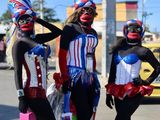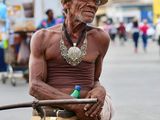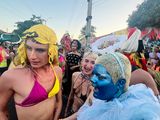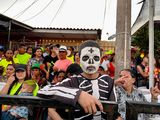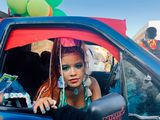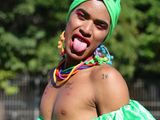By Lea Thin, freelance writer
The Carnival in Barranquilla attracts over 1.5 million visitors from around the world annually to participate in its colorful parades and lively celebrations. The hotspot of the carnival is Vía 40, one of the main streets in the north of the city, where the famous "Batalla de Flores" (Battle of Flowers) takes place. It’s the place of the largest and most spectacular parades with decorated floats, dance groups, and musicians delighting the spectators. Yet despite the impressive festivities, the true spirit of the carnival is about to be vanished by commercial interests for mass tourism.
Misleading tourism marketing
The Caribbean carnival developed from the fusion of African, indigenous, and European influences during the colonial period. It emerged as a way for enslaved Africans to retain and express their cultural identity and to mock the European festivities. While for international tourists the parades might appear as the reproduction of colonial stereotypes, the masks and costumes don’t have the same dimension as Zwarte Piet or Black facing have in Europe. The representations in the carnival in Barranquilla even work in the opposite way: As a form of reappropriation of the racist narrative, or even an affirmation of blackness. However, it is not the parades and performances itself, but the commercialization of the carnival that fosters wrong assumptions about colonial glorification and exotism. Tourists are invited to a spectacle rather than learning about the real spirit of the Caribbean carnival. Media representations and tourist providers often focus on the more sensational aspects of carnival while neglecting the deeper cultural and historical significance of the celebrations. This can reinforce stereotypes among tourists with little knowledge about the festivities while the carnival in Barranquilla is actually a space of joyful commentary, democratic enjoyment, a classless utopic moment, a pluri-cultural melting pot, a safe space for dissent.
Carnival as Class Struggle
The Carnival in Barranquilla also reveals a social disruption within the city, rooted in the colonial class society. Through the separate celebrations of the upper class in the wealthy north and the folk festivals of the lower classes in the rural south, this colonial class society is, in a sense, maintained by the carnival. But contrary to popular belief, carnival in the Caribbean has no colonial roots. "On the opposite”, explain activists and artists from the carnival collective 'La Nave de Lxs Locxs,' translated as 'The Ship of Fools,' “The carnival in the Caribbean originated from resistance against racist and colonial stereotypes. It was for people to enjoy and forget everything with the little they had. It was a total spiritual surrender." Barranquilla, as the 'Puerto de Libres' (Port of the Free), played a special role. "In the neighboring colonial cities of Cartagena and Santa Marta, the elite and the church managed to drive out the carnival. The carnival then came to Barranquilla over the river, together with many immigrants and freed slaves," the collective adds.
Mass Spectacle vs. Tradition
In contrast stands the carnival, which today is promoted by numerous tourism providers and travel guides. The true carnival in Barranquilla breaks down, deconstructs, and weakens stereotypes. Mass tourism is not only a drawback but a significant part of the problem: "Tourists pay to watch a staged spectacle from a safe place. They want to briefly immerse themselves in a culture but then quickly disappear before it becomes uncomfortable. For this safe place as an observer, they pay a lot of money. Their money flows to those who already have enough of it, without any commitment for the community. Most of the money ends up in the hands of the elites, who try to capitalize on and also embellish the carnival," states the collective 'La Nave de Lxs Locxs'. Danny González, a professor at the Universidad del Atlántico in Barranquilla, carnival researcher, and founding member of the collective, believes that UNESCO would have revoked Barranquilla's World Heritage title long ago if they reviewed the designation: "It seems that the economic and political elite are more interested in economically exploiting the carnival than preserving its traditions. The city wants to offer a spectacle to the money-bringing tourists and remove the true character of the carnival.”
A Ship of Fools
In contrast, the south of Barranquilla offers a much more authentic carnival experience. A significant location is Calle 17 in Simon Bolivar district, particularly known for the "Rey Momo" parade. However, due to security and infrastructure problems, tourism is significantly limited there. The collective 'La Nave de Lxs Locxs' is active here. This group of artists, activists, and performers advocates for social justice, political change, and cultural diversity. They organize creative actions, performances, workshops, and events annually during the carnival in the south of the city to raise awareness of social issues. Their art and performances serve as a means of political mobilization and empowerment, addressing topics such as feminism, LGBTQ+ rights, anti-racism, and environmental protection.
Carnival is activism
The collective emphasizes the ritual and revolutionary significance of the carnival: "The Caribbean carnival enables the spiritual encounter between Black people, indigenous peoples, feminist, and LGBTIQ+ collectives. It takes place on all streets throughout the city, making its forms diverse and complex. What happens on Vía 40 and attracts thousands of international tourists annually is just a carnival show designed for spectators. In the traditional carnival, however, we are all actors." Despite the criticism of carnival tourism, international visitors are generally welcome—under certain conditions: "We are not interested in growing, becoming famous, or making money from our events. We can make our social critique visible through our performances, but that only works in a manageable framework where people can also interact with each other," explains the collective. "Our carnival is not a product to be consumed but rather a process in which everyone on site is involved. Therefore, our events are only for people who are willing to step out of their comfort zone and genuinely engage.”


